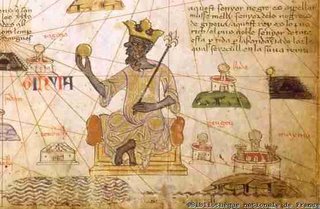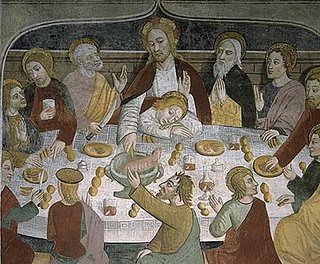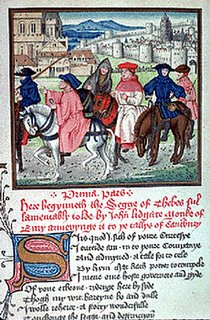 Fifteenth-century Flemish tapestry.
Fifteenth-century Flemish tapestry.Via Ted at The Late Adopter, a Slate article on pulp fiction that begins by quoting a wonderful example of the genre's attention-grabbing opening sentences:
On this spot where Hollywood would one day grow, two vaqueros were crushing a priest to death with his own wine press.I might have to hunt that story down. I have very little time for literature now, and after a day of academic articles and Latin charters, I'm really not in the mood for rereading Ulysses. I choose fun things of differing literary quality. Right now I'm reading Count Magnus and Other Ghost Stories by M. R. James (1862-1936), Cambridge medievalist and one of the masters of the ghost story genre. A wee bit back I read Matthew Lewis' magnificently over-the-top gothic novel The Monk.
—J.J. des Ormeaux, in Dime Western
In between the two I went for something sillier, The Lustful Turk, an example of nineteenth-century British "erotica." I apologize if anyone is shocked by my indulgence of Victorian porn, but I have always found it terribly amusing. The variety of euphemism is wonderful, and the weird mix of sex and proper old-fashioned English prose is hilarious. It's sort of like getting Queen Elizabeth II drunk on tequila and asking her what the Duke of Edinburgh is like in the sack. It is also fascinating just as social artifact: what can you learn about a society from its porn? I don't want to do this for our own society, it's too depressing, but nineteenth-century England is another question.
The Lustful Turk lives up to these expectations, and yet is mercifully short, since it relies on repetition of the same story as a plot point. It follows the capture by pirates of the young, beautiful, and virginal Emily Barlow who is presented to the Dey of Algiers and promptly initiated against her will into the pleasures of the flesh. At first horrified, she soon becomes an enthusiastic participant. Then she meets two of the Dey's other wives, and we hear the same story of conquest repeated with little variation.
Even though I was not taking the book seriously, I found the repeated emphasis on rape disturbing. Culturally, I should have expected it -- the male "other" is often represented sexually as both aggressively threatening and exaggeratedly potent. The African-American man is portrayed this way in our society and so was the Jew in medieval society. Since it was a Victorian treatment of "the east," I took my copy of Edward Said's Orientalism off the shelf. Said refers only briefly to The Lustful Book, but he led me to a 1964 book that has more to say about it: The Other Victorians: A Study of Sexuality and Pornography in Mid-Nineteenth-Century England by Steven Marcus. Marcus remarks that our book is one of the first of a long line of books in the genre. He focuses on the story's phallo-centrism and how it relates to literature. Although his discussion is fascinating, he does not mention what seemed obvious to me when reading the book: the relationship of rape and conquest to imperialism.
The Lustful Turk was first published, it appears, in 1826, just a quarter way into the great century of European colonial expansion. Marcus, discussing the historical development of pornography (although he concentrates on more domestic aspects of sexuality), says:
Although the impulses and fantasies with which pornography deals are trans-historical, pornography itself is a historical phenomenon. It has its origins in the seventeenth century, may be said to come into full meaningful existence in the latter part of the eighteenth century, develops and flourishes throughout the nineteenth century, and continues on in our own [p 282].That is, it follows the same path as European (and later American) imperialism. There are many interpretations that could be drawn from this observation, but I will limit mine to what I felt as I read The Lustful Turk: the fantasy of domination extends to both sexual and political spheres. The Dey is terrifying and violent, but in the end he is right. He has to take what he wants by force, but as the violator and the violated settle into the situation, the violated realizes that what seems like brutal and unfeeling exploitation by the violator is actually a gift and to the benefit of both parties. Domination by violence seems brutal, but in reality it brings peace through the gifts the dominator can only give by imposition: sexual pleasure, civilization, democracy...
Of course there is an odd tension throughout the book: the violated women are European and the rapist is the ultimate "other," an Oriental, a Turk. Marcus warns us against using literary analysis too much in studying pornography: pornography and literature serve different purposes. The anonymous author of The Lustful Turk is out for thrills, not consistency. The fact that Emily is English allows the male reader to read her thoughts expressed in his language and idiom. It also may provide the misogynistic thrill of seeing the domination of a woman of his own society, the nearest "other" to him. It permits the projection of one's own aggression onto the orientalized Turk, and the exotic location in which there is complete domination of women (the harem) is probably another thrill for the Victorian man. Still, the tension causes the author to flip the situation on its head in the bizarre ending of the novel: the Turk attempts to rape a Greek girl who defends herself by castrating him. He allows Emily not only to return to England, but to take with her the severed member preserved in a jar! The author has it both ways: domination of women and castration of the threatening other.
I propose we think about fantasies of domination and forced gifts of pleasure. Perhaps after all, The Lustful Turk is not, as I had thought, light reading.
PS: Please read the post below about the internet if you have not yet done so -- it's important.













